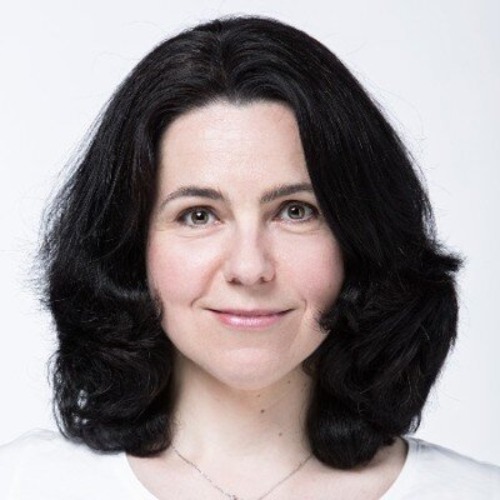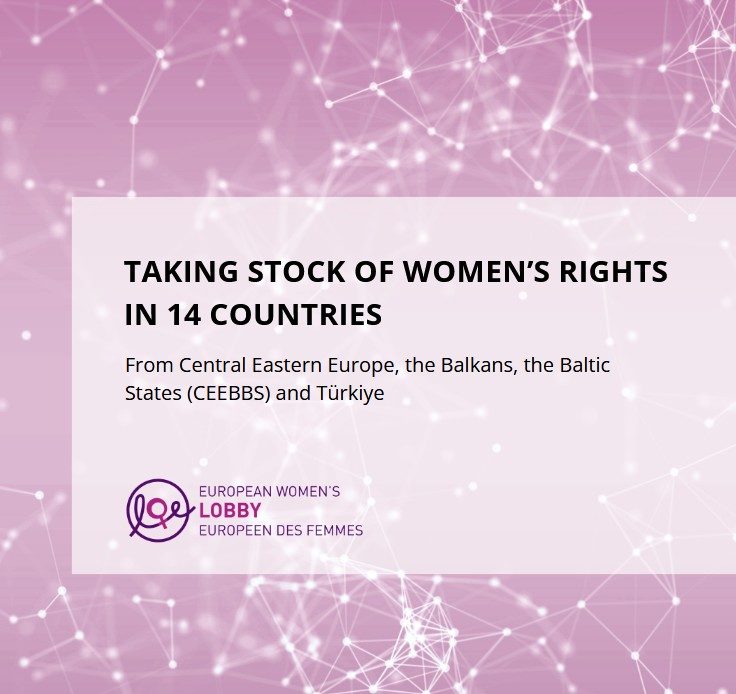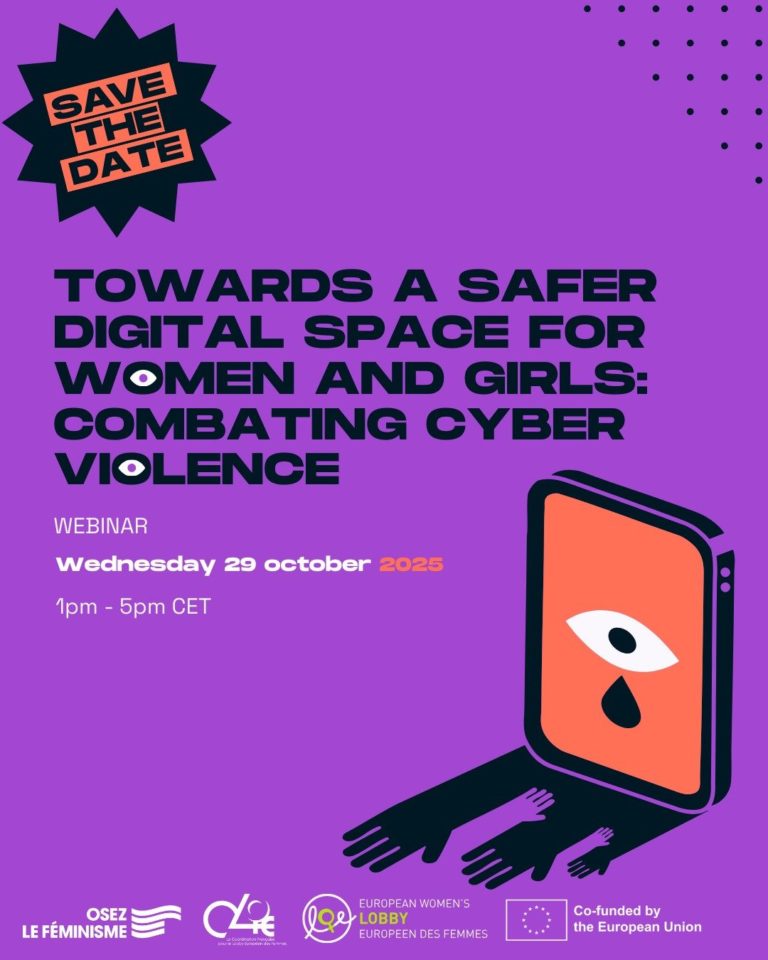Last Monday 7 June 2021, the Board of Administration of EWL elected their new President for 2021-2023: we are enthusiastic to welcome Réka Sáfrány, chair of the Hungarian Women’s Lobby, as our new President. In this interview Reka shares something about her background and her vision for the European feminist movement and EWL.
[*First of all congratulations, Réka! We’re honoured to have you as our President and look forward to getting to know you better. As we all came to feminism through different paths, we were wondering if you would like to tell us how you first got passionate about equality between women and men and women’s rights.*]
Thank you very much. There were a few factors that played a role in my interest for equality and women’s rights in different moments of my life. First, being brought up by a working single mother that did her best to conciliate her professional commitment and her dedication to the family was a strong inspiration. Then, during my university studies I had the chance to cross paths with the leading feminist personality of Antonia Burrows, that I can definitely consider a mentor. She introduced Gender Studies elements in her courses (actually concealed in the language courses syllabus, given the regime times!) and helped set up a still thriving association called NANE, which assists victims of domestic violence, inspiring a whole generation of feminists in Hungary. Later on, having become a teacher myself, while being fascinated by the heterogeneity of my classes with respect to the age and background of my students, I came to realise the big role racism and sexism still played in shaping students’ future plans and cultural assumptions, as in our society as a whole. That made me want to try and contribute to making a difference through my work, first in academia as a researcher, and later in civil society: I first joined MONA Foundation for the Women of Hungary, in 2004, and then in 2012 the Hungarian Women’s Lobby, of which I became Chair in 2017, which brought me increasingly into contact with international projects. Meanwhile, I also had the great fortune of becoming the mum of two daughters.
[*One of the enriching aspects of an umbrella organisation such as EWL is bringing together feminists from very different national contexts. Having you as President coming from a Central & Eastern Europe (CEE) country will surely bring in interesting perspectives. Could you tell us a bit about your perception of the issue of equality and women’s rights in relation to the Hungarian reality?*]
The first thing that comes to mind when it comes to equality in Hungary, is the big gap between politicians’ intentions and the reality of our society. While we have a new institutional framework for equality and gender mainstreaming, these issues are not high enough on the political agenda and there is a persistent gap in how urgent society perceives these issues to be. And building this bridge is one of our biggest challenges. This makes us very different from Austria or Sweden for example, where Gender Mainstreaming is possible in so many areas. As we underlined in one of the latest report by the EWL CEEBBS taskforce, the equality situation in Hungary is influenced by the conservative political climate that identifies equality between women and men as a threat to the more traditional family model that is advocated by conservative forces and opposed to the equality one. In this situation, sometimes seeing and achieving improvements can be quite hard. But as we work hard with our fellow feminist activits within HWL and beyond, we acknowledge some very encouraging signs that make us believe in a better future.
[*Could you give us some examples of the achievements you are most proud of as a feminist activist?*]
Well, witnessing the increasing engagement of journalists and younger generations in defending and advocating for equality between women and men is certainly an achievement. I really see that as an encouraging sign. Indeed, I particularly believe that younger generations are essential in bringing fresh, creative and passionate perspectives to our movement. But, the achievements I’m most proud of are collective, rather than personal. Working with EWL’s past and current members has been the most unique learning opportunity for me about the power of collective feminist activism, which I am honoured to be able to carry on and cultivate. I believe that the richness and the diversity of the women’s movement are key to bringing about meaningful change. Already within EWL we have an example of how diverse our movement can be in terms of background, age, race, migration status or profession, and the more we can enable typically underrepresented women to join our ranks, the more authentically we will be able to represent the complexity of female roles and realities. Still, everyone is connected by the passion for their mission. I think that cultivating solidarity and mutual acknowledgement as well as respectful communication both within our national environment and the wider feminist movement, can really make us proud and build a solid basis to rely on each other and keep fighting to change women’s lives.
[*Could you tell us more about the vision you have for the future of the European Women’s Lobby?*]
I believe this is the moment for us to go back to the basics and strengthen women’s human and civil rights. The global COVID-19 pandemic has had a huge impact on women, and still represents a major challenge that we cannot ignore. It has exposed and amplified core issues that women have been struggling with for a long time, such as violence, poverty, inequality. At EWL, we have worked to identify such impacts since the very beginning of the pandemic, bringing these issues to the attention of governments very early on. Now our analysis is further backed by statistical data, such as the recent EIGE- supported study, and it’s time for us to continue taking stock of the longer-term effects of the pandemic: we should dig further and explore how many women have become jobless, homeless, victims of violence, and how they can now be supported and protected. In parallel, women’s rights need to be upheld through international standards. We are witnessing a backlash, both in Hungary and throughout Europe, in several forms, for example with countries threatening to withdraw from the Istanbul Convention, one of the most important international legal instruments to defend women and girls from violence. These phenomena need to be understood and tackled at the core, and I hope that coming from a Central European country, we can contribute to building a deeper analysis of the context and root causes of this backlash. I think part of it comes from people’s dissatisfaction with the EU project, which sees stronger roots in peripheral EU countries and in our region. Populist ideas have indeed found fertile ground in such dissatisfaction, with gender equality issues being scapegoated as a major side effect. As feminists we can work to change this by introducing key concepts such as the need for a Care Deal for Europe. We will also work to contribute to ensuring that there are strengthened ties and cooperation across the EU, including the EU periphery.
When it comes to my vision of the internal development of EWL, I would like to work in close collaboration with the Executive Committee and Board of Administration to ensure we foster honest and effective communication at every level of our network, while promoting mutual trust and valuing diversity. I believe that great teamwork between the organisation’s governance, members and staff will be key to make the organisation continue to thrive.
[*Is there any issue that is particularly close to your heart and that you would like EWL to focus on in the near future?*]
As a former researcher in gender studies, there are several aspects of equality between women and men that I consider important, but certainly, tackling violence against women and girls should be one of our main priorities. My interest in this topic dates back to my university thesis already, when I investigated how the issue of violence against women and girls was gradually making its way into the political discourse at the time, thanks to the strategic thinking and passion of feminist activists including EWL and with the support of a few dedicated politicians. Nowadays, violence has taken many new forms and it is crucial to raise awareness of them all. The hypersexualisation of women’s bodies – and especially girls’ – that often has a detrimental impact on young women’s self-esteem and can lead to their sexual exploitation by others is a concrete example of the direction in which our society is going, despite recent feminist achievements. As a mother, I consider this a major new challenge to be urgently addressed. And I believe that betting on the empowerment and education of young women on their rights will be essential to foster change in this sense. We need to include and value their voices in order to shape a better society. We have recently seen inspiring and incredibly strong-willed young women such as Greta Thunberg and Malala Yousafzai speaking up and being given a seat at high-level decision making tables, and I think this should set an example for future practice at EU and UN level fora.
You can find out more about our new Executive Committee and Board here.



